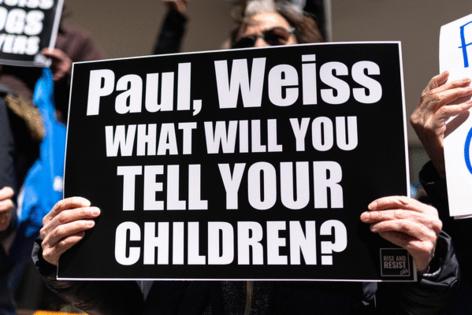Big law must stop caving to Trump's demands
Published in Political News
Big law firms that have offended President Donald Trump for representing a cause or client he doesn’t like are being forced to make a choice: Either cut a deal with him to protect their billion-dollar businesses, or sue him to assert their right to continue representing clients as they please.
It was extremely disappointing when Paul, Weiss, Rifkind, Wharton & Garrison — a hugely successful firm that has been heralded for its commitment to causes and clients potentially adverse to Trump’s agenda — bent the knee to the president.
Paul, Weiss agreed to a number of Trump’s dictates, including a pledge to represent clients of all political affiliations; have its hiring decisions audited for Trump-disfavored diversity, equity and inclusion initiatives; and donate tens of millions in pro bono services to the president’s pet causes.
While I’ve been highly critical of law firms since founding The American Lawyer magazine nearly half a century ago, I’ve stuck to the belief that these were partnerships of professionals committed to uphold the principles of their profession, and who believed that running a business well did not have to compromise those principles. Now that belief is being tested.
This is not a partisan issue or a pro-MAGA or anti-MAGA issue. Rather, it has to do with abuses of executive power that undermine democracy. Will the next Democratic president feel empowered to issue executive orders to cripple firms that represent Trump or that have adopted his causes?
Defending democracy from authoritarianism depends on three pillars: the press, the courts and the legal profession. If the government tries to rein in the press from reporting what the people need to know, the courts must be there to protect the press. If the government tries to act beyond its authority, the courts must be there to protect the victims. But the courts cannot do any of that if there are not competent, willing lawyers to press the case. Lawyers are the lynchpin of everything that protects our society.
Happily, several of the biggest law firms have gone in the opposite direction of Paul, Weiss. Three top partnerships also targeted by the Trump administration — Perkins Coie, Jenner & Block, and WilmerHale — have sued, successfully so far, to enjoin executive orders that could wipe them out.
Among other things, the firms’ lawyers would be forbidden from entering federal buildings, stripped of security clearances, and barred from meeting with any federal officials. Worse still, the order directed all federal agencies not to do business with any outside companies that use these firms, even if what the vendors use these lawyers for has nothing to do with the government (a telecom provider or a real estate company, for example). The three firms are being represented by fierce defenders of the rule of law, including Paul Clement, who served as solicitor general under President George W. Bush.
But another large firm, Skadden, Arps, Slate Meagher & Flom, has also “settled” with the Trump administration — capitulating in advance of getting an executive order. So, it’s still unclear whether Paul, Weiss’s cave-in will be the rule or the exception.
What is clear is that rule of law cannot function without smart, tough lawyers. As a partner at another highly successful firm told me: “Yes, we make a lot of money. But we’ve talked about it, and we’re prepared to fight and even suffer financially for a few years. We have to, and we think our clients will understand that. The rule of law is what we do.”
A few days ago, I ran into Brad Karp, the chairman of Paul, Weiss, and I followed up with an email. One of my questions was: “You’re almost certain to get another test. It’s abundantly clear that if you take on a client or cause that the president doesn’t like, he will try to bully you and your ‘partners’ again. Will you take on that client or cause, even if it means you end up with a smaller firm but one with real partners?” He promised that he would. We’ll see.
Journalists who cover the law and law firms should follow up and hold the leaders of all large firms accountable. Get them all on the record about which path they are choosing: to fight for their constitutional rights and those of their clients, or to bend to the whims of a president with apparently little respect for either.
_____
This column does not necessarily reflect the opinion of the editorial board or Bloomberg LP and its owners.
Steven Brill, the founder of The American Lawyer and Court TV, is the co-CEO of NewsGuard.
_____
©2025 Bloomberg L.P. Visit bloomberg.com/opinion. Distributed by Tribune Content Agency, LLC.




























































Comments